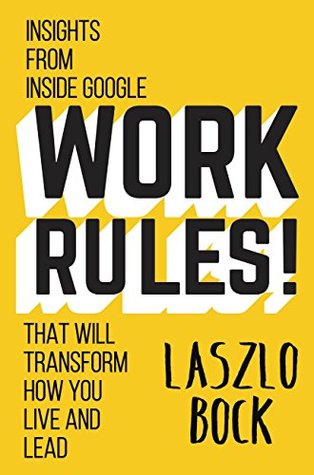More on this book
Community
Kindle Notes & Highlights
by
Laszlo Bock
Read between
March 30 - April 10, 2021
Danny Wegman, says that ‘leading with your heart can make a successful business.’
“Managers serve the team,”
a manager focuses not on punishments or rewards but on clearing roadblocks and inspiring her team.
Performance improved only when companies implemented programs to empower employees (for example, by taking decision-making authority away from managers and giving it to individuals or teams), provided learning opportunities that were outside what people needed to do their jobs, increased their reliance on teamwork (by giving teams more autonomy and allowing them to self-organize), or a combination of these.
only when companies took steps to give their people more freedom did performance improve.
it’s when the economy is at its worst that treating people well matters most.
All it takes is a belief that people are fundamentally good—and enough courage to treat your people like owners instead of machines. Machines do their jobs; owners do whatever is needed to make their companies and teams successful.
The fundamental lesson from Google’s experience is that you must first choose whether you want to be a founder or an employee. It’s not a question of literal ownership. It’s a question of attitude.
One day your team will have an origin story, a founding myth, just like Rome or Oprah or Google. Think about what you want it to be, about what you want to stand for. Think about what stories people will tell about you, your work, your team. Today you have the opportunity to become the architect of that story. To choose whether you want to be a founder or an employee. I know which I’d choose.
The most powerful movements in history have had moral motivations, whether they were quests for independence or equal rights.
revolutions tend to be about ideas and not profits or market share.
We all want our work to matter. Nothing is a more powerful motivator than to know that you are making a difference in the world.
Fundamentally, if you’re an organization that says “Our people are our greatest asset” (as most do), and you mean it, you must default to open.
Ethan Burris of the University of Texas at Austin found that “Getting employees to voice ideas has long been recognized as a key driver of high-quality decisions and organizational effectiveness.
Culture matters most when it is tested
“Only hire people who are better than you.”
Superb hiring isn’t just about recruiting the biggest name, top salesperson, or cleverest engineer. It’s about finding the very best people who will be successful in the context of your organization, and who will make everyone around them more successful.
the US Department of Veterans Affairs has a site with almost a hundred sample questions at www.va.gov/pbi/questions.asp.
If you believe people are fundamentally good, and if your organization is able to hire well, there is nothing to fear from giving your people freedom.
“Jim Barksdale, the legendary CEO of Netscape, in one of these management meetings said, ‘If you have facts, present them and we’ll use them. But if you have opinions, we’re gonna use mine.’
Jonathan Livingston Seagull, later wrote in Illusions, “Argue for your limitations, and sure enough, they’re yours.”
What managers miss is that every time they give up a little control, it creates a wonderful opportunity for their team to step up, while giving the manager herself more time for new challenges.
The joy of money is fleeting, but memories last forever.
Simple, public recognition is one of the most effective and most underutilized management tools.
Even the best of us fail once in a while. What’s important is how you respond to that failure.
People can exist, indeed did exist for thousands of years, without companies. But companies can’t exist without people.
“Your right to swing your arms ends just where the other man’s nose begins,”
“A crisis is an opportunity to have impact. Drop everything and deal with the crisis.”
If people are good, they should be free.
The question is not what management system is required to change the nature of man, but rather what is required to change the nature of work.
Work consumes at least one-third of your life, and half your waking hours. It can and ought to be more than a means to an end.
If you believe human beings are fundamentally good, act like it. Be transparent and honest with your people, and give them a voice in how things work.
your employees what they would change to make things better, or what they would change if it was their company. Because that’s how you want them to behave. As if it were their company. And the only way for that to happen is if you give up a little bit of your authority, giving them space to grow into it.
make this plea to your boss: Give me a chance. Help me understand what your goals are, and let me figure out how to achieve them.
A bad hire is toxic, not only destroying their own performance, but also dragging down the performance, morale, and energy of those around them.
Hire by committee, set objective standards in advance, never compromise, and periodically check if your new hires are better than your old ones.
The proof that you are hiring well is that nine out of ten new hires are better than you are.
One of the best ways to learn a skill is to teach it.
Ninety percent or more of the value on your teams comes from the top 10 percent. As a result, your best people are worth far more than your average people.
Even if you join a company fresh out of school, as a junior employee, or as employee number 1,000,006, you can still be a founder by choosing how you interact with those around you, how you design your workspace, and how you lead.


